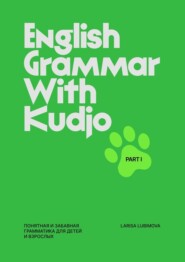скачать книгу бесплатно
He is looking for his ball but can’t find it anywhere.
EXERCISE 6
Поставьте глагол в каждой паре в Simple или Continuous :
1 have
a We *****a delicious dinner now
b We ***** a lot of books about dogs at home.
2 see
a I ***** that Kudjo is hungry.
b We ***** our family this weekend.
3 look
a He ***** so miserable now!
b Everybody ***** at Kudjo because he is carrying a big bone in his mouth.
4 smell
a He ***** so fruity now!
b He ***** the snow suspiciously.
5 taste
a His lunch ***** very good.
b He ***** a new bone
6 think
a Look at him! He ***** of doing something naughty!
b I ***** he wants to go out immediately.
7 have
a He ***** a lot of tasty food.
b He ***** a nap. Don’t bother him.
EXERCISE 7
Представьте свой идеальный день. Напишите: что вы делаете в данный момент и что вы обычно делаете в это время:
For example,
It’s 8 a.m and Kudjo is running with our dogs in a garden where tasty treats grow in the trees.
He usually wakes up at 8 a.m.
EXERCISE 8
Отметьте правильный вариант ответа:
1 Kudjo ***** football with professionals now.
a playing
b plays
c is playing
2 Kudjo ***** a robot-hoover.
a hate
b is hating
c hates
3 Kudjo ***** sleeping with toys.
a enjoys
b enjoy
c is enjoying
4 Kudjo hardly ever ***** for a walk without a leash.
a go
b goes
c going
5 We ***** the shopping together today.
a doing
b are doing
c do
6 Kudjo ***** milk because of the white color.
a don’t drink
b doesn’t drink
c isn’t drinking
7 Don’t touch this toy! It ***** to Kudjo.
a is belonging
b belong
c belongs
EXERCISE 9
Переведите предложения, используя Present Simple and Present Continuous:
1 Куджо любит гулять зимой, когда ужасно холодно.
2 Мы сегодня идем выбирать новую игрушку для моей собаки.
3 Куджо редко играет дома, но всегда отнимает игрушки у других собак на улице! (это мне очень не нравится)
4 Ты видишь Куджо сейчас? Что он делает?
5 Он не смотрит дог-шоу, он крепко спит.
6 Он не понимает тебя сейчас. Говори по-английски.
7 Куджо сейчас обедает. Он всегда ест после прогулки.
Unit 4
Past Simple Tense
Простое прошедшее время
Прошедшее простое время показывает регулярное, законченное действие в прошлом. Все глаголы делятся на правильные и неправильные. Правильные глаголы (regular verbs) образуют форму Past Simple с помощью окончания -ed, в то время как неправильные (irregular verbs) имеют свою особую форму, которую можно найти в таблице неправильных глаголов в конце книги.
Например, купил -bought, закрыл-closed.
Утвердительное предложение выглядит так:
подлежащее + глагол в форме Past Simple.
Kudjo woke up five minutes ago.
EXERCISE 1
Поставьте глагол в форму Past Simple:
When Kudjo /be/ a little puppy,
1 he /play/ all day long.
2 he /have/ too long legs and /fall/ down every time
3 he /love/ all the dogs that he /meet/.
4 he /taste/ everything that he /find/.
5 he /bark/ when he /be/ excited and he /be/ excited 20 hours a day!
6 he/can/ go 10 km non-stop.
7 he /enjoy/ looking at his reflection in mirrors and shop windows.
8 he /love/lying next to the laptop and watching me working.
Отрицательная и вопросительная формы строятся точно так же, как и в Present Simple при помощи вспомогательного глагола do в прошедшем времени- did.
Обратите внимание, что сам основной глагол при этом остается в нулевой форме.
Структура отрицательного предложения:
подлежащее+ did + not + глагол.
He didn’t go downstairs on his own.
При этом сокращенная форма didn’t звучит более естественно.
EXERCISE 2
Поставьте глагол в отрицательной форме в Present Simple или Past Simple:
1 When Kudjo was little, he/not like/ sleeping much. But now he /not like/ waking up early.
2 When Kudjo was little, he /not want/ to stay alone. Now he /not mind / doing it.
3 When Kudjo was little, he /not come/ up to big boxes and bags, now he/not come/ up either.
4 Yesterday he /not stay/ out for a long time because of a biting frost.
5 He /not wear/ clothes because he has thick fur.
6 He even /not bark/ yesterday because it was too cold to open his mouth.
7 He/not get/ any treats yesterday.
8 He usually /not go/ to bed before midnight and he / not kip/ down so early last night.
Вопросительное предложение в Past Simple выглядит так:
(вопросительное слово) + did + подлежащее + глагол?
What time did he go to bed last night?
